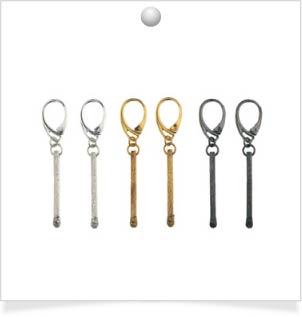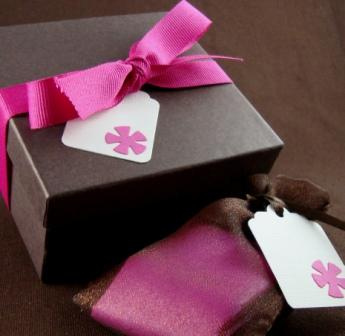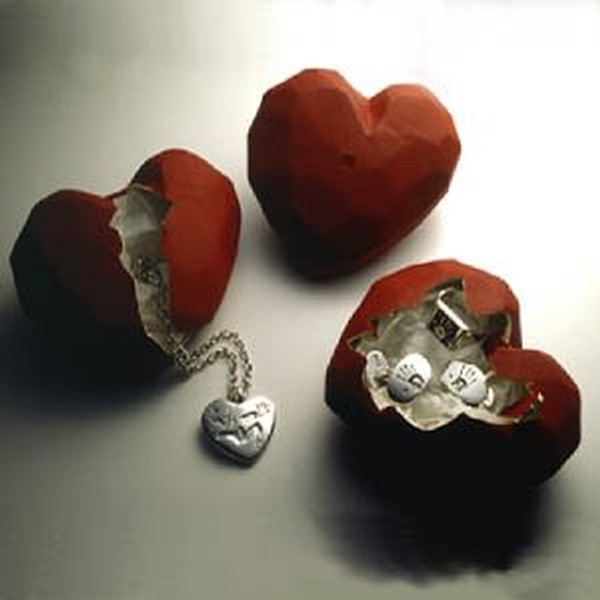This article is a follow-on from the two that I wrote yesterday and Monday, which provided an overview on the packaging design aspects encountered in the recent mini series High Street Dreams on BBC1; The ‘reality TV show’ about product branding, packaging & design development. Over the series Jo Malone and Nick Leslau helped a number of individuals to launch new products.
Today we focus on Programme 3: ‘Fashion accessories’ striving to be the next fashion brand and in particular on Claire English, a contemporary jewellery designer from Lewes, East Sussex, making distinctive and eclectic homemade jewellery.
Help and advice was provided to Claire on the show in the form of Stephen Webster, a jeweller to ‘the Stars’, including Christine Aguellera, Kate moss and Cheryl Cole. He emphasised that, as a newcomer, Claire must “earn every inchâ€, “convey her story†and “focus†her collection. He thought that she needed a ‘hero’ (star) piece, to ‘draw the eye’ in the ‘polished’ environment of a designer shop to hold potential customer interest.
Claire did subsequently amend her product range and decided to be ‘the face & name’ of her own brand. During ‘market research pitches’ in a real retail environment, although her creative skills were without question, doubts about her commercial ability to run a business were raised. However, the team decided to let her pitch to Selfridges, the ‘flagship store’ in Oxford St, London, to Anne Pitcher the Buying and Merchandising Director. Claire’s packaging provided a “Beautiful presentation” with pretty bows and ribbons and cut with scissors – a nice touch! At £2 each, the boxes weren’t cheap (especially for a small business when the minimum order quantity is 1000), but they ‘did the trick’.
Some of Claire’s jewellery, made from unorthodox items such as ‘bubble blowers (see picture above) and matchsticks were seen as ‘very English’, with good ’stand-out’ in media such as magazines that would “give the ‘press’ something to talk aboutâ€. Indeed Claire was commended by Anne: “Congratulations – Quite extraordinary – You have thought about PR and POS materialâ€. Although she was warned to “think about the competitionâ€, which is something that is often a good starting point for us at Design Cognition when thinking about designing any new packaging. Not that we would necessarily follow the ‘norms’ of a particular sector, but at least it can provide a useful ‘benchmark’.
Ultimately although Selfridges liked Claire’s work very much, saying that it was†quite specialâ€, they did not place an order on the day, because the jewellery was only at prototype stage. They wanted to wait until they had seen a ‘production sample’. Seeing as Claire’s work is now listed on her website as “available online from Selfridgesâ€, we are assuming that she was finally successful, although there only appears to be one product on-show. A good starting point, but to develop a thriving business Claire will evidently need to ‘roll this out’ further at Selfridges and also through other channels. The on-line shop on Claire’s own website appears to be “coming soonâ€, which is a shame because she’s probably missing out on a lot of the good PR from the TV show, which could have given her a good kick start with her fledgling business.
Granted, that packaging is not the main selling point for a Claire’s jewellery – especially if it’s going to be sold on-line. However most of the items will be bought as gifts, and for a price of around £100 per item, customers will expect some nice packaging as part of the price.
As mentioned in my previous postings, when developing effective packaging, a unique set of circumstances needs to be considered, depending on the product itself, the route to market (whole supply chain) and consumer needs involved. Packaging performs a number of varied and important roles; containing, protecting. preserving, transporting, informing & selling and has to meet a number of important stakeholder needs at all stages of the supply chain, from manufacturing & filling, through warehousing & transportation, retail and consumer-use to final disposal or reuse.
Purchasing ‘fashion accessories’ like jewellery is a much more ‘tactile shopping experience’ than for other products like foods. As Claire seems to be concentrating sales presently through an on-line route, perhaps this is not so much of an issue, but as the brand and sales channels develop into more ‘customer facing’ ones, needs will evolve.
Claire showed on the programme that she has ‘an eye’ for some innovative gift packaging ideas with her bows & ribbons and this is a good start. This will enhance perceived ‘value’ and if developed to mirror her other branding will reinforce the brand credentials.
So what sort of things should Claire consider? Let’s have a look at them one at a time:
Selling
On-line retail means the packaging does not really need to perform a selling role at Point of Sale (POS). However, the benefits of ‘added value’ gift packaging have already been mentioned and this can help promote referrals from clients, friends and relatives. If done properly and using stylish ‘must have’ packaging that could also act as a funky jewellery box, with subtle use of branding, the packaging will perform a permanent sales role on the dressing table. It may also help promote ‘up-selling’ to other pieces of Claire’s jewellery & trinkets. All merchandising; packaging, brochures, website design etc – all need to work together to provide a consistent message and brand image. Take a look at the Daisy Chain packaging in the photo that is something that someone would want to keep and cherish.
Informing
If selling through retailers such as Selfridges, product and bar code information will be required. This may not necessarily be so for Claire’s own website initially, but as her business grows, this type of information will greatly aid her stock control. For consumers, useful information could include, at a basic level – jewellery name, collection name, materials, colour, price, contact details but at a more emotional and engaging level, provides an opportunity for Claire to ‘connect’ with her target market. She could’ like Beryl in yesterdays article, provide all sorts of information on the brand heritage, her vision for the business, brand values, the methods she uses to make the jewellery, the quality of materials & methods used and really build an emotional story on which to ‘pivot’ the brand.
Transporting
From Claire’s online store, I should imagine that most of her transport needs are met by DHL or some other courier. I’m not sure what sort of stock-holding Selfridges will want to keep (if any), but it’s certain that they will want to manage & move their stock in the most efficient way possible. To enable this, as well as relevant information, they will want jewellery boxed into suitable multiples (6, 10, 12 or whatever). The shipping boxes used will require their own ITF bar codes to enable ease of handling & storage.
Protecting
Jewellery manufactured from ‘hardy’ metallic materials but can be very delicate at the same time. Careful use of traditional ‘padding’ materials like coloured tissue paper can provide a simple enough ‘filler’ to protect the product from scratching and crushing, but at the same time can also provide a lovely ‘backdrop’ to accentuate and contrast the glistening colours of the metalwork. As well as product, any lovely gift boxes will need to be protected in some suitable transit packaging if being sent vie courier; it is not uncommon for packets to be used as ‘footballs by postal workers.
Containing
Containment is usually more of an issue for products like liquids and powders, which can spill or leak, rather than jewellery. Although Claire is presently selling on-line, as she builds a portfolio of products being sold in retail stores, she might want to consider how consumers will ‘contain’ their jewellery and gift boxes during the trip from shop to home. As with Beryl, this is another ideal opportunity for her to provide some ‘added value’ packaging, such as high quality branded shopping bags or boxes that will raise brand awareness and ‘perceived brand value’ with consumers and act as a ‘walking’ advert through the shopping streets of our towns & cities. Take a look at the novel Stephen Einhorn ‘Heartbreak’ packaging, which provides a great ‘twist’ on containment, with all sorts of subliminal messaging that will help engage potential customers.
I hope that this has highlighted SOME of the packaging considerations that need to be taken into account when developing a product like jewellery and supplying it to market. I’m not sure how many of these issues were discussed ‘off camera’ during the programme, but they all play their role in a successful launch, and ‘branding’ is only part of the picture. So well done Claire and we wish you every success in the future.
You can find out more about Claire’s products from her Claire English Special Jewellery website.
Over the next 2 days, I’ll take a look at the other 2 products covered in the last TV programme and, as well a giving an overview of what happened in those shows and how packaging and design aspects were tackled as above, I’ll also take a ‘step-back’ and provide my own thoughts on some of the other important issues that those entrepreneurs need to consider (or should have considered already) in the successful launch of their products to a mass market! So keep your eyes open for the following postings on this site:
Thursday 22nd July: ‘Homeware’ – Harry Singer from Somerset with his innovative wall hanging picture ‘Monkey frames’ ( Phlib) product.
Friday 23rd July: ‘Homeware’ – Bex Simon an artistic blacksmith who designs beautiful one-off metal-ware objects for the home.
Chris Penfold



